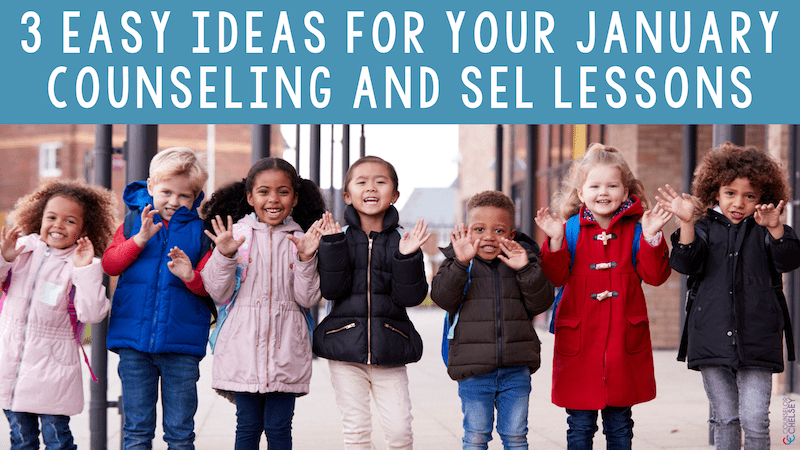3 Easy Ideas For Your January Counseling And SEL Lessons
Coming back to school in January after winter break can feel like coming out of a fog. If you’re struggling with the adjustment period (or just want to make your life a little easier), these lesson ideas are sure to help. Below, you’ll find 3 topics that are perfect for your January counseling and SEL lessons, along with resources and activities to use with your students.
This post contains affiliate links. Please review my full disclosure policy for additional information.
January Lesson Idea #1: Goal Setting
New Year’s resolutions have gotten a bad rap. Maybe it’s because we almost never stick to the goals that we so eagerly set for ourselves. But, that doesn’t mean that we need to throw out goal setting entirely. Having goals can be a great way to help us stay focused and achieve the things that are important to us. Use the “fresh start” feeling that January brings to talk about goal setting with your students!
Activity Idea: Use this free SMART Goals lesson and booklet to help kids learn about what a SMART goal is and to create their own. The lesson is no-prep, and includes a 6-page booklet where students can identify their own goal and think about how each letter of the SMART acronym applies to it.
Try This: When talking about goals with students, try asking them about who they’d like to be, not just what they’d like to do. Ask them what positive characteristics they’d like to further develop, and then work together to come up with a plan.
January Lesson Idea #2: Growth Mindset
Having goals is great, but meeting them can be challenging sometimes. Of course, reaching our goals doesn't always go smoothly. We experience challenges, road blocks, and even lack of motivation. Teach your students to persevere and understand that these challenges, mistakes, and setbacks will help them grow!
Activity Idea: Mistakes, failures, and challenges can make it easy to give up. Inspire your students to keep going by talking about the way that many famous people have pushed through tough and discouraging situations. This is a great chance to show kids that even the most successful people struggle. It also encourages them to think about all that they can accomplish if they don’t stop chasing their goals!
One of my favorite ways to talk about this is to make it a guessing game. I describe the challenges someone famous has gone through, and they try to guess who I’m talking about. Here are some examples:
Who was in a girls singing group that lost a major competition and was dropped by their record label before releasing an album? (Beyonce)
Who had two unsuccessful art businesses before establishing the company that would become one of the biggest entertainment businesses in the world? (Walt Disney)
Who was a poor, single parent with clinical depression who had his or her book rejected 12 times by publishers? (JK Rowling - Author of the Harry Potter series)
Read about more “famous failures” here.
More Blog Posts About Growth Mindset:
January Lesson Idea #3: Expected & Unexpected Behavior
January is perfect for reviewing behavior expectations and systems. One of my all-time favorite ways to talk about this is by using the concept of expected and unexpected behavior. Expected behavior is simply behavior that is normal, reasonable and anticipated. Unexpected behavior is behavior that is out of the norm, and is unusual. In these lessons and conversations, I help students identify the difference between expected/unexpected behaviors, and we talk about how those can change depending on the situation. We also talk a lot about how these types of behaviors make others feel.
Activity Idea: To introduce the concept, have a student choose one of their favorite restaurants. Talk about what they expect when they go there, and then talk about how they would feel if things weren’t as they expected. For example, how would they feel if they went to their favorite pizza restaurant and all of the lights were off and they were serving pancakes. Chances are, that situation would leave them feeling confused, uncomfortable, and maybe even frustrated.
Then, talk about how our behavior is similar. In certain situations, there are different behaviors that are expected of us, and when we do something unexpected, it causes the people around us to feel confused or upset. Work together to think about different situations the student(s) may encounter, as well as behaviors that are expected and unexpected in each setting.
Pre-Made Resources:
The return to school after winter break can be a struggle. My hope is that these 3 ideas will help you plan your January counseling & SEL lessons so that it’s easier to re-adjust to that alarm clock every morning! If you’re looking for more time-saving tips, make sure you sign up below for my weekly e-mails. Each Monday, you’ll get practical ideas and activities delivered directly to your inbox.








